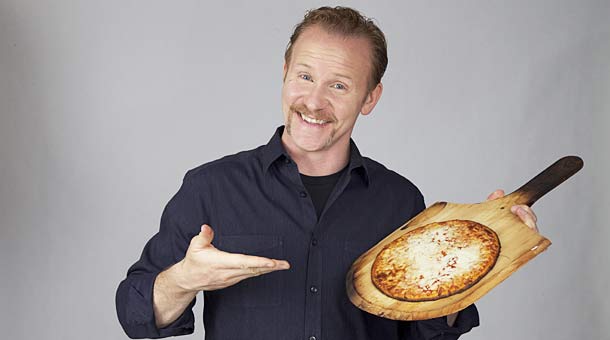
The Greatest Movie Ever Sold

Morgan Spurlock, who is best known for his Super Size Me documentary that shook up the fast food industry in 2004, is determined to do the same for the advertising industry in The Greatest Movie Ever Sold? Not quite. The film offers more of a satirical look into product placement. He interviews people that go into how much product placements have gotten out of hand in TV shows, while they shameless zoom in on Spurlock drinking a beverage from a main sponsor.
His goal is to make a documentary by transparently showing the process behind getting corporate sponsorship for product placement. He wants to make a “docbuster” of a film with a ton of different sponsors that fund the film but at the same time it is a direct shot at selling out. The whole point is to be contradictory which that makes it interesting and at the same time questions the ethics behind it.
Spurlock gets some help from a bunch of different agency’s that try to help guide him along the process of getting corporate sponsorships. One of the first places he goes is to figure out what is his brand personality. They ask him a bunch of personal questions and eventually tell him he has a playful and mindful personality. That paradox is the exact fundamentals of the film so that came as no surprise.

After finding out what his brand personality is, he decides to start cold calling and pitching his film. He calls several companies such as; Ford, Red Bull, Guess Jeans, Nike and Nintendo but they all end up with the same answer, not interested. Some of their responses are quite funny such as when one said that nudity would help.
The first few companies that bite on the pitch are smaller companies who are willing to take a chance. The biggest concern they have with the documentary is the potential of negative press they would get, a logical concern to have. However, Spurlock is able to talk them into the positives of being a sponsor in a way that a seasoned salesman pitches clients; smooth talking, cracking jokes and a killer presentation.
Within the first half hour of the documentary, Spurlock gets his first large corporation, POM Wonderful. They not only want to be the official beverage of the film but also the main sponsor. He tells them that would cost a million dollars and they agree but not without some strings attached.
POM Wonderful’s contract states before he receives the money he needs to complete certain requirements. Some of them are; the film needs to be shown on over 250 screens worldwide, sell at least 500,000 DVDs, generate 600,000,000 media impressions and make more than $10,000,000 at the box office. Those are just from POM Wonderful’s contract, most of the others have some requirements as well.
One common requirement is that the brands wanted final approval of the film. This worries Spurlock into thinking he will not get to make the film he wanted to make because they will not all agree with the final film. He seeks help from his own lawyer, a former co-chairman of NBC Entertainment, Noam Chomsky and even Ralph Nader on what his options are. When asked if there is any truth to advertising Nader responses, “Yes. Advertisements that say they are lying are telling the truth.” But Nader’s witty responses do not end there, when asked where we should go if we do not want to see advertisements he says, “To sleep.”
Next he sits down and interviews some a few big name film directors such as J.J. Abrams and Quentin Tarantino about how important sponsors are now days in film. A few of them agree that if product placement is done in a clever way then no harm no foul, everyone is selling out to someone. But there are still purists who believe in the art of film and about story telling not story selling. One such purist that was mentioned was P.T. Anderson, my favorite director.
The Greatest Movie Ever Sold ends up achieving what Morgan Spurlock wanted from the very beginning, a transparent look at product placements with product placements all over. The paradox ingeniously plays into itself and while he is half-jokingly pitching an idea about a shampoo brand, he is in-fact by nature pitching it to film audiences.
While the idea behind the film is smart and is genuinely interesting it is by no means groundbreaking. Most of us are aware to some extend of product placement in films and TV shows so the gist of the film is known. It briefly dives into the moral dilemma of what it means to sell out but the issue treads lightly. The only real obstacle he faces in the film is how to fulfill contract agreements. It does, however, provide some interesting information on what sponsors care and do not care about in a playful make-fun-of-yourself way.
